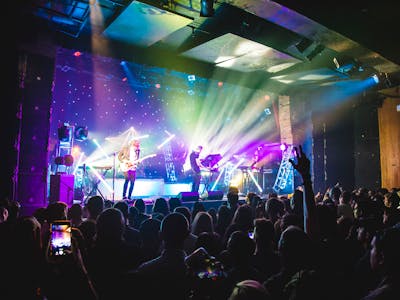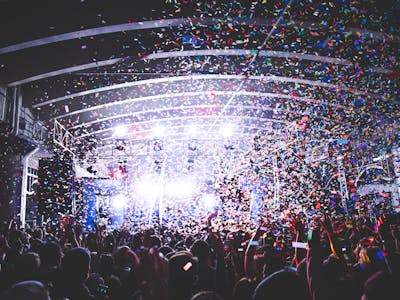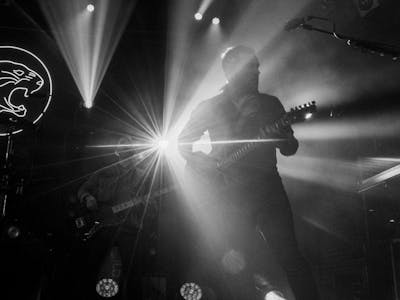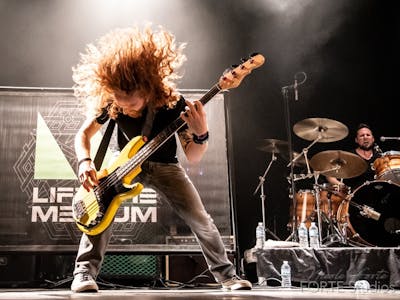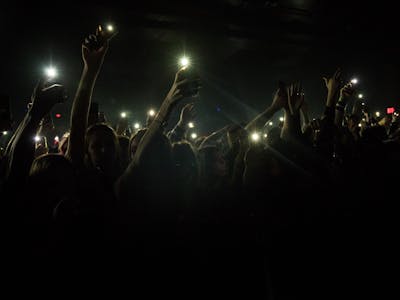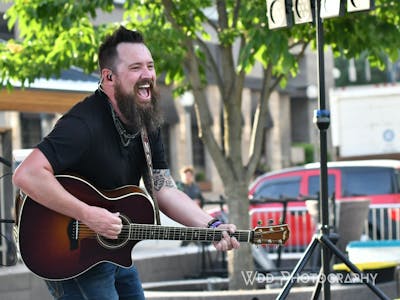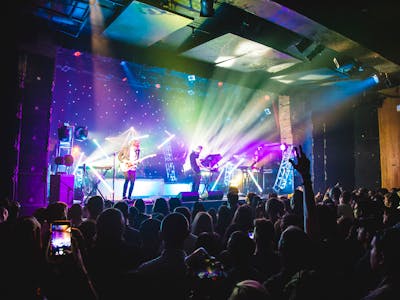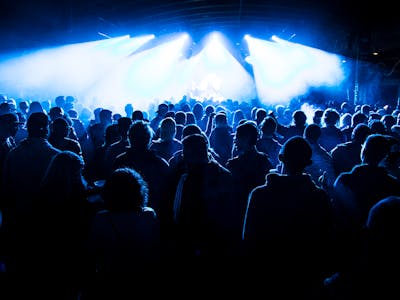This guide is intended for artists & bands that want to take their career into their own hands. No one is going to care more about the success of your show than you, so it’s important that you don’t assume that anyone else is going to promote your show for you. You can view our Complete Guide to Booking & Promoting Shows here.
Once you begin playing larger venues & events there will be event marketing professionals that promote events on the artist’s behalf. We created an extensive event marketing guide for people in those positions as well. It probably doesn’t hurt to browse through that guide, but the recommendations below are better suited for artists/bands playing smaller shows with limited / no budget.
Concert Promotion Checklist
Download our concert promotion checklist so that you can have a detailed action plan for every show you book. Simply walking through the steps on this checklist will help increase the visibility of your event & make sure you are making the most of your opportunity.
Concert Promotion Checklist
Enter your email address to download our Concert Promotion Checklist.
Create Localized Art
Before you announce your event you should put some time into creating an admat, or template for all the art surrounding your event. For inspiration you can visit tourdesign.com, byp.com, or gtc.co. You are going to need a consistent look/feel for all of your assets which can include posters, flyers, facebook event images, social media images, display ads, etc. You don’t have to go crazy. Sometimes just agreeing on one good press photo & your band name is all you need.
Event Listings
One of the most crucial things you need to do once you book a show is to list the event on various websites. Check out our complete guide to listing your event online.
Show Posters / Flyers
One of the most reassuring things you can do for venue owners / bookers is to show up to their venue a few days after announcing your event with posters. It proves that you are going to put in the work to make the show a success.
Simply print up about 50-100 11x17 posters & at least 1,000 flyers. Distribute the posters to the venue you are playing and local businesses that cater to the audience you are trying to attract. Curate lists of every local record store, tattoo shop, coffee shop, bar, co-working space, etc. Be sure to hit up local College campuses too. Don’t just drop off the posters with the person behind the counter. Ask if you can hang the poster yourself. Otherwise, your poster is going to collect dust behind the counter.
Make a list of events / shows that your target audience is going to be attending. Try to find out when the show is going to be letting out & stand outside passing out fliers for your event. 95% of people won’t want the flier or will simply take it to be polite. Don’t worry about them & focus on the 5% of people that turn around & come to your event. 5% of 1,000 is 50, which wouldn’t be a bad showing for a young local band.
One note of caution: It’s rude to bring fliers into a competing venue or flier cars, but it’s fair game to pass fliers out to people as they are leaving the show. You certainly don’t want to get into the politics of the local music scene, so just focus on shows at clubs with a capacity of 1,000 or greater. Those events typically let out between 10-11 & give you the best opportunity to hit a ton of people in a short period of time.
You can explore more ideas in our post about guerrilla marketing tactics for events.
Email Marketing
Email marketing has consistently been one of the most important avenues of communication for the live event industry for over 20 years. A standard open rate for commercial messages is 13%, but you can see 30%+ for highly relevant / targeted emails. Compare that to the average 2% of Facebook followers that even get your post placed in their timeline. Plus, you own your email list.
For a deep dive, check out our post on email marketing for events.
For the purpose of local shows it all boils down to growing your email list and notifying your email list prior to each event. At its core this seems pretty simple, but people miss the mark all the time. Run contests on your website & at your merch booth to gain opt-ins. People typically don’t mind signing up to receive information about when your band is playing.
Event Publicity
Maintaining strong relationships with local music blogs, alt weeklies (CityBeat), local news producers, editors, on-air talent, and journalists is crucial to getting coverage. We have created a pretty exhaustive post on event publicity for event marketers.
Consider which media outlets reach the people you are trying to attract to your event. Once you define your target publications/outlets it is important to take some time to consider how you can craft an announcement that appeals to each individual on your list. I suggest reaching out one by one & typing up a fresh email to each contact. No one likes receiving the same press release you sent to 100+ other people. Send carefully curated notes to each person with ideas for coverage for their particular outlet.
Organic Social Media
Social media has become an enormous topic. Below are excerpts from our post Social Media Management: 10 Tips for Event Marketers.
- Provide Value: Don’t shout at your audience. Posting ticketing links & your show poster every other day simply won’t work. Give your audience content that they want to see.
- Establish Your Brand Voice: Make a decision about the type of voice your brand is going to have on social media & stick with it.
- Remember That You Have a Cool Job: If you have been doing this for a while you have probably lost touch with the fact that the process of promoting, rehearsing for, and performing at an event is pretty interesting. Snap some photos along the way & share your story!
- Use an Editorial Calendar: Make a plan & share it with your band. Scheduling a good mix of event announcements, artist updates, contests, and photos will keep your audience engaged.
- Contests & Giveaways: Set up some simple enter to win contests for tickets to your shows. Don’t forget to use this as a way to grow your email list.
- Be Responsive: Maintain your artist page/profiles as if they are your personal accounts. Respond to direct messages, answer questions, and have a conversation with people in the comments.
- Don’t forget about Event Pages: Many people are so focused on producing content for their feed that they forget to pop into their Facebook Event Pages. This is a great place to share information about the show & interact with people that have already indicated they are interested.
- Don’t Obsess Over Growth on a Platform: Social platforms come & go, so don’t obsess over how many people follow you. Instead, focus on delivering value to the audience you already have. Ironically enough, you will end up getting more likes or followers by being authentic.
- Don’t Ever Hit the Boost Button: For the love of everything that is good, stop “Boosting” your posts! It’s tempting to take Facebook up on their offer to show your post to an audience for only $10. However, You are severely limiting your options when doing this ‘lite’ version of Facebook Ads. Instead, take a few minutes to set up Facebook Ads Manager.
- Track Analytics: Have a clear understanding of what metrics are important to you. Of course conversions (ticket sales) are the ultimate goal, but there is a journey of engagement before the purchase. Don’t worry too much about conversions or link clicks if your goal is engagement.
Paid Advertising
In our event marketing guide we do a deep dive into several topics related to advertising for live events. Most of these tactics are not relevant for the types of shows you are likely promoting for your own band. The truth is that your focus is primarily on education / awareness of your show and band. Highly targeted digital advertising can be effective, but I wouldn’t recommend placing anything broad on Radio. Regardless, knowledge is power so here are a few helpful links:
An Event Marketers Guide to TV Advertising
An Event Marketers Guide to Radio Advertising
How To Create A Custom Audience on Facebook
How To Create A Custom Audience on Snapchat
Here are a few custom audiences we recommend building on the platforms that allow you to build them (Facebook / Snapchat for now):
All Website Visitors: Create an audience that contains anyone that has visited your website over the past 180 days (the max time-frame allowed).
Email Subscribers: Create an audience that contains anyone that is in your database. Include people that have subscribed to your mailing list.
Event RSVPs: Create an audience that contains anyone that has responded Going or Interested to any of your events over the past 365 days (the max time-frame allowed).
Facebook Page Interactions: Create an audience that contains anyone that has engaged with your Facebook Page over the past 365 days (the max time-frame allowed).
Instagram Account Interactions: Create an audience that contains anyone that has engaged with your Instagram Account over the past 365 days (the max time-frame allowed).
